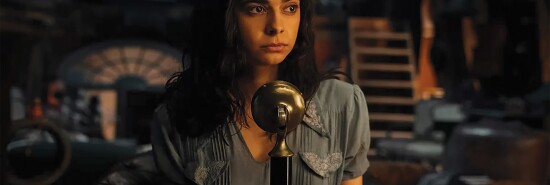
Netflix’s All the Light We Cannot See smothers a good novel with moralism
Graham Hillard
The jokey headlines write themselves: “A Little More Light, Please,” “Stumbling in the Darkness,” and “All the Bad Television We Cannot Unsee.” I will refrain, with regret, from adding to the list and state merely that Netflix’s adaptation of Anthony Doerr’s 2014 novel is a clumsy squandering of serious promise. One more, you say? Oh, all right: “All the Potential We Cannot Realize.”
Like its Pulitzer-winning source material, All the Light We Cannot See is set in wartime France, in the port city of Saint-Malo. There, on the top floor of an otherwise abandoned house, Parisian refugee Marie-Laure LeBlanc (Aria Mia Loberti) reads Jules Verne into a shortwave radio while awaiting the return of her missing father and uncle. Because the 16-year-old has been blind since childhood, her days are necessarily circumscribed: Nazis prowl the streets, and American bombs have begun to fall. Yet Marie’s transmissions are about more than simply passing the time. Read in a particular order, Verne’s pages provide aid to the French Resistance. “You are sending messages in code,” one character tells Marie, “that will help to win the war.”
REVIEW OF LOKI, SEASON TWO: MARVEL’S MULTIVERSE STRAINS UNDER ITS OWN COMPLEXITY
Of course, Resistance fighters are not the only men and women with ears to hear. Among Marie’s listeners are a pair of Germans who bring their own obsessions to the broadcasts. The first, Sgt. Maj. Reinhold von Rumpel (Lars Eidinger), is a Nazi jewel-hunter convinced that Marie possesses a priceless stone. The second, Werner Pfennig (Louis Hofmann), is the series’s rival protagonist, a German radio operator who shares an unlikely childhood connection with Marie. Told by his superiors that the young woman is an enemy agent, Werner moves to protect her, in the belief that her broadcasts represent “a place of hope” that the Reich cannot destroy. When, near the end of the pilot episode, a fellow soldier discovers his secret, Werner promptly murders him. How’s that for loyalty to the fatherland?
Unsurprisingly, much complaint has been lodged online about Werner’s “good-German” stylings. The opposite problem is the more significant one. In the hands of showrunner Steven Knight (Peaky Blinders), Nazis are creatures of maniacal wickedness, lacking any human dimension and practically slabbering with rage. The result is not harrowing but trite: A well-drawn Disney villain inspires more dread than these ranting caricatures. Nor is Knight’s portrait a lamentable historical necessity. That Nazis terrify us still is a function of their pretensions to virtue. They thought — the notion should startle us — that they were doing the right thing. To portray them as knowingly, gleefully evil is to let them off the hook.
If the show’s antagonists are regrettably one-dimensional, its heroes fare a little better. A figure of marked insubstantiality, Werner spends much of the series reacting to the depravity of others, a failing that mars both the central timeline and the various flashback plots in which the young man is involved. In the production’s grim second episode, we see the adolescent Werner as a mining-village orphan, sorely abused at a grotesque military academy. Even in Saint-Malo, however, fully grown and physically deadly, he is far too often a slave to fortune. A man with no discernible inner life, he exists as pure opposition. What he actually wants, beyond fuzzily defined “kindness and reason,” is unclear.
As for Marie, she is an insipid angel, a representative of unvarying goodness whom the show’s writers dare not weigh down with anything so interesting as a blemish. Her role, established in the early going and rarely expanded, is to suffer nobly in the service of a righteous cause. If drama is what happens when ethical lines blur compellingly, then Marie’s character is every bit as destructive to Netflix’s adaptation as the Nazis are. Incapable of wrongdoing, sainted but dull, she is a source of monotony rather than excitement.
CLICK HERE TO READ MORE FROM THE WASHINGTON EXAMINER
Were its sententious perspective the series’s only flaw, All the Light We Cannot See might provide some value as a war-era morality play, a successor to the church-produced medieval dramas that taught peasants not to blaspheme or covet their neighbors’ wives. Alas, the show’s failings extend even to the technical elements of production, discoloring everything from the characters’ accents (inexplicable) to the set design (overly precious). Yet even these errors are nothing compared to the series’s excruciating dialogue, which pours down in great torrents of exposition and regularly treats the viewer like a historically illiterate fool. To the German officer who provides a quick summary of the Holocaust in Episode One, I can only offer my sincerest gratitude. However would we follow the plot without you?
Could Netflix’s adaptation have been good? I think so. Doerr’s novel, though melodramatic to a fault, contains passages of lyric beauty and builds to a devastating conclusion. And God knows the production cost enough, as money practically leaks from between each excessively sumptuous frame. In the end, however, Netflix has created a shallow, preachy, poorly acted, obnoxious, insulting, teen-soap-opera calamity of a World War II “epic.” If this isn’t the worst serious television show of the year, I’ll be shocked.
Graham Hillard is a Washington Examiner magazine contributing writer and editor at the James G. Martin Center for Academic Renewal.
